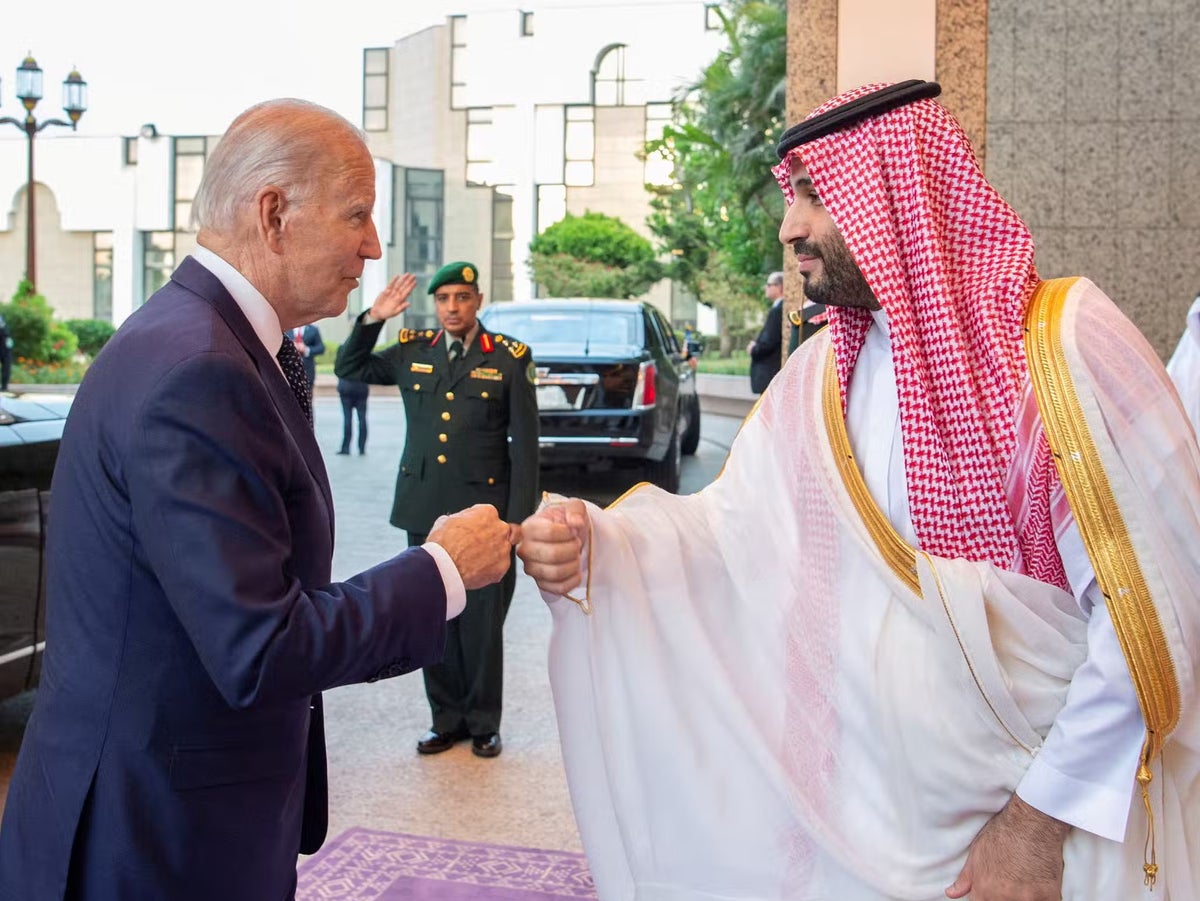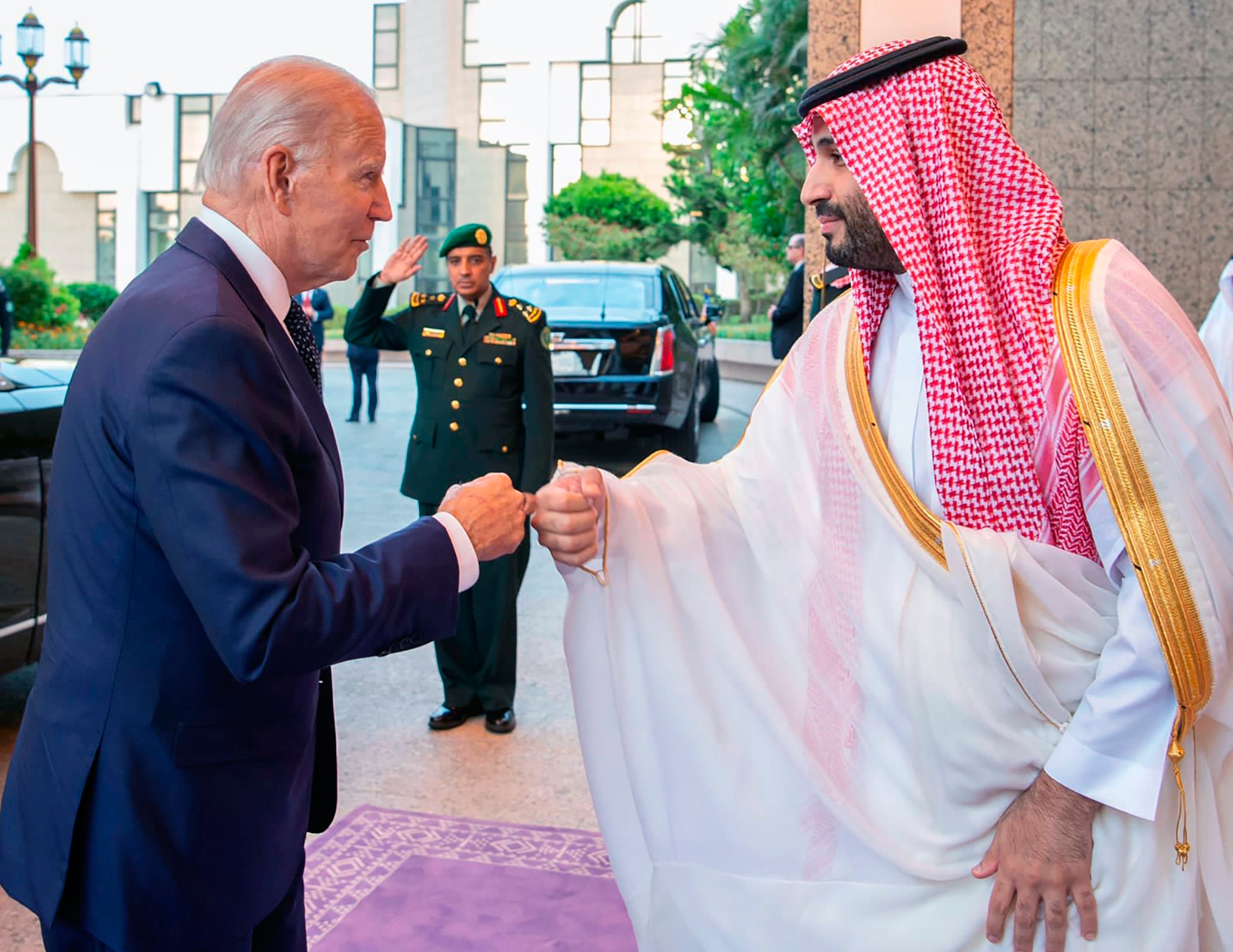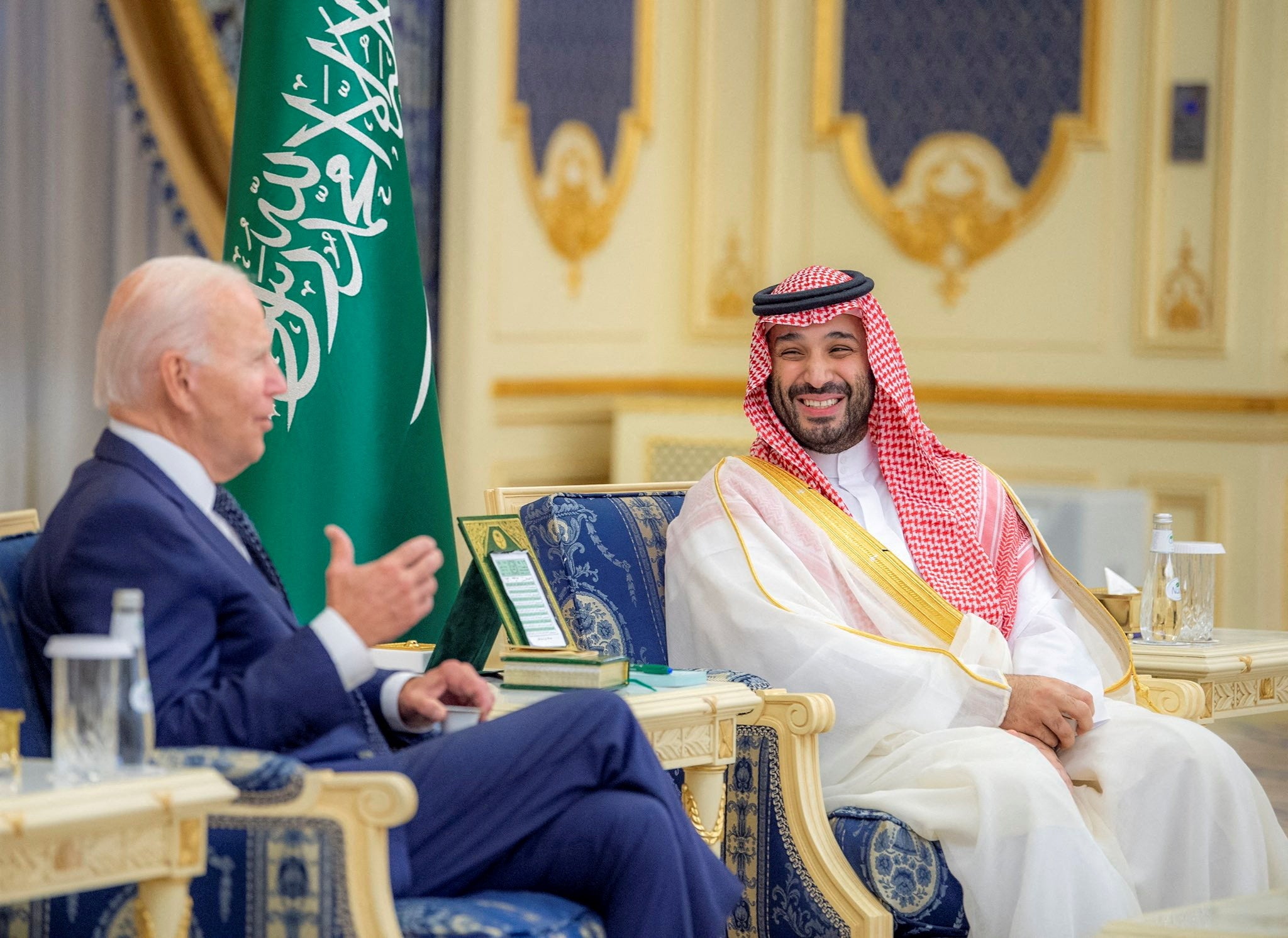
President Joe Biden’s first day in Saudi Arabia ended with him unable to avoid a moment he and his advisers had taken great pains to avoid: a televised fist-bump with the man who ordered the murder of Washington Post journalist Jamal Kashoggi.
The brief encounter between Mr Biden and Mohammed bin Salman, the Saudi crown prince who is widely known by his initials, MBS, took place not long after Mr Biden’s arrival in the kingdom for two days of meetings with Saudi officials and leaders from across the Gulf region.
White House officials had hoped to avoid any image of Mr Biden engaging in a handshake or any sort of greeting with MBS by claiming at the outset of the trip that the nearly 80-year-old president would be eschewing handshakes as a precaution due to rising Covid-19 cases in the region. But Mr Biden scuttled that plan within minutes of his arrival in Israel for the first leg of his trip when he greeted the Israeli opposition leader Benjamin Netanyahu with a hearty grip-and-grin.
Upon his arrival in Jeddah, the first item on Mr Biden’s agenda was a bilateral meeting with King Salman bin Abdulaziz Al Saud. But the president was greeted instead by MBS. Presented with the choice between the handshake he wanted to avoid and further upending the US-Saudi relationship, the president chose to compromise with a Covid-conscious fist-bump.
The pair had another awkward moment at the outset of an expanded meeting between US and Saudi officials when an American reporter, Peter Alexander of NBC News, shouted a question at MBS: “Jamal Kashoggi — will you apologise to his family?”
None of the assembled leaders said anything in response before reporters were ushered out, though the US television camera caught the crown prince smirking while he ignored the question.
But in remarks to reporters following the meeting, Mr Biden said he’d made the slaying of the Post columnist the first order of business in his discussions with MBS.
“With respect to the murder of Kashoggi, I raised it at the top of the meeting, making it clear what I thought of it at the time, and what I think of it now,” said Mr Biden, who described himself as having been “straightforward and direct” in bringing up the murder, which US intelligence officials found to have been ordered by the crown prince.
“I made my view crystal clear ... for an American president to be silent on an issue of human rights is inconsistent with who we are and with who I am,” he said.
According to Mr Biden, MBS’s response was to claim he had not been “personally responsible” for the murder and stress that he had “[taken] action” against those he’d deemed responsible. The president said he told the crown prince that he would view any attempt to strike at critics of the Saudi government in other countries as “a violation of human rights”.
“What happened to Kashoggi was outrageous,” he said.

In response, Mr Khashoggi’swidow, Hanan Elatr Khashoggi, tweeted: “I would like to personally thank @POTUS for raising my husband, Jamal Khashoggi's murder with the Crown Prince. He raised it first and foremost and I for that I am grateful. This is only the beginning of accountability for my husband's murder.”
She added: “I along with my legal team intend to hold all parties accountable for my husband’s murder through the American justice system.”
Mr Biden spoke to reporters roughly five hours after arriving at King Abdulaziz International Airport in Jeddah aboard Air Force One after a two-hour flight from Israel’s Ben Gurion Airport. The president’s plane was the second-ever flight to travel directly from Israel to Saudi Arabia, the first such flight having been made by a charter plane carrying the White House press corps several hours earlier. Both aircraft landed less than a day after the kingdom announced it would open its’ airspace to all carriers, including those departing from Israel.
Saudi Arabia and Israel have never recognised each other and do not have diplomatic relations, and the kingdom has never before allowed any flight from Israel to transit through its airspace. That longstanding prohibition was lifted on Thursday after the Saudi General Authority of Civil Aviation said the country's airspace would henceforth be open to all air carriers in line with international treaties.
The announcement that Saudi Arabia would allow flights from Israel, which Mr Biden called “a big deal” and “the first tangible step in the path of what [he hopes] will eventually a broader normalization of relations,” came after months of US-led negotiations between the kingdom, Israel, and Egypt which led to the resolution of a long-standing dispute over a pair of Red Sea islands.

The Saudi leg of Mr Biden’s trip has attracted no shortage of controversy in light of statements he made during his 2020 presidential campaign regarding his desire to treat the kingdom as a “pariah” over its human rights record and the crown prince’s role in the murder of Mr Khashoggi.
Mr Biden’s trip to the Saudi kingdom has drawn criticism from members of both major US political parties, with Democrats complaining that it legitimises MBS and ignores Saudi Arabia’s atrocious human rights record, and Republicans mocking Mr Biden for seeming to beg the royal family to increase oil production in hopes of helping his party salvage the November midterm elections, as Mr Biden’s arrival in Jeddah comes as Americans have been reeling from skyrocketing inflation, which the White House says is largely driven by high oil prices.
But White House National Security Adviser Jake Sullivan said the trip is part of Mr Biden’s strategy for “ensuring that there is not a vacuum in the Middle East for China and Russia to fill,” and to show that the US intends to play a “critical role” in the “strategically vital region”.
Mr Sullivan, who spoke with reporters aboard Air Force One en route to Jeddah, said Mr Biden will discuss “energy security” matters at his meetings with Saudi officials, as well as leaders from the “GCC plus three” nations who will convene on Saturday — Bahrain, Kuwait, Oman , Qatar, and the United Arab Emirates, plus Iraq and Egypt.
But Mr Sullivan said the White House does not expect an immediate increase in petroleum output as a result of Mr Biden’s conversations, though he added that administration officials remain “hopeful” that “Opec Plus” — the 13-members of the Organisation of the Petroleum Exporting Countries and a group of non-Opec oil exporters led by Russia — would take “additional actions” to boost output “in the coming weeks”.







